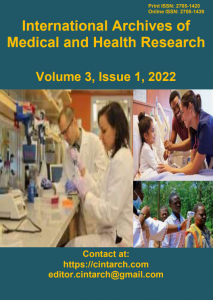
International Archives of Medical and Health Research (IAMHR), pISSN: 2705-1420; eISSN: 2705-1439
July to September 2022 Vol 3(1): pp.23-30 DOI: https://doi.org/10.33515/iamhr/2022.008/03
Copyright © 2022 C-International Archives
Original Article
Prevalence, associated factors and adverse effects of internet addiction among medical students at Usmanu Danfodiyo University, Sokoto, Nigeria
Ali Samaila1*, Kehinde J. Awosan1, Tomori A. Bakare2, Ikwueje S. Eneojo2, Ifeanyi J. Nkwoka1, Muhammad L. Dawakiji1, Adejoh A. Enejo1
1Department of Community Health, Usmanu Danfodiyo University, Sokoto, Nigeria
2Department of Psychiatry, Usmanu Danfodiyo University Teaching Hospital, Sokoto, Nigeria
*Corresponding Author’s Email: asaliyu117@gmail.com
Published September 30, 2022
ABSTRACT
Background: Internet addiction has become a serious social problem among youths, particularly undergraduate university students in developing countries, including Nigeria. Aim: This study aimed to determine the prevalence, associated factors and adverse effects of internet addiction among medical students at Usmanu Danfodiyo University, Sokoto, Nigeria. Materials and Methods: A cross-sectional study was conducted among 200 randomly selected medical students at Usmanu Danfodiyo University Sokoto, Nigeria. A structured self-administered questionnaire was used to obtain information on the research variables. Data were analyzed using IBM SPSS version 25 statistical computer software package. Results: Close to two-thirds, 119 (59.5%) of the 200 respondents had internet addiction, with 91 (45.4%) having mild addiction, and 28 (14.0%) having moderate addiction. Internet addiction was associated with the use of both mobile data/personal hotspots and College Wi-Fi for internet access and spending ≥ 6 hours on the internet per day. The adverse effects experienced by the respondents include excessive internet use with a waste of time and money (22.5%), loss of self-control (19.6%), neglect of social life (11.0%), and neglect of academic work (7.0%). Conclusion: This study showed a high prevalence of internet addiction among medical students at Usmanu Danfodiyo University, Sokoto, Nigeria. Internet addiction was majorly associated with internet use practices, and about a fifth or less of the respondents experienced some adverse effects. The university management should periodically organize sensitization programs on the hazards of excessive internet use for their students, and also screen them for internet addiction and its adverse effects to facilitate timely interventions.
Keywords: Internet addiction, prevalence, associated factors, adverse effects, medical students

